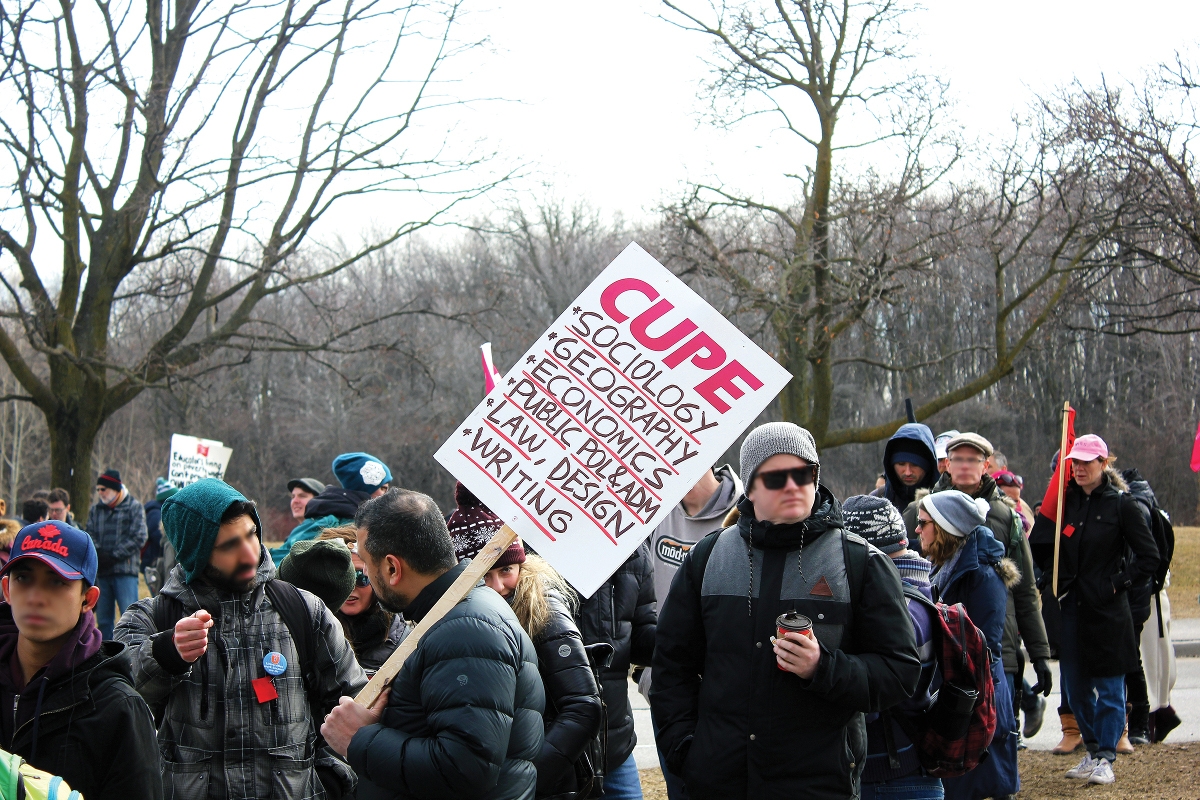Dennis Bayazitov | Assistant News Editor
Featured image: After CUPE 3903 passed on York’s final offer, the union is now officially on strike. | Basma Elbahnasawy
After six months of unsuccessful negotiating to settle on a collective bargaining agreement—unlike U of T’s local 3902 and Ryerson’s 3904—York’s Canadian Union of Public Employees (CUPE) local 3903 is officially on strike.
On March 6, members from CUPE 3903’s Unit 1 (teaching assistants), Unit 2 (contract faculty), Unit 3 (graduate assistants), and professors and students showing solidarity, gathered in -1 degree weather to commence the picketing process. Each of York’s main road entrances—at Shoreham Drive, Northwest Gate, Founders Road, The Chimneystack Road, York Boulevard, The Pond Road, and Sentinel Road—is now intermittently barricaded by picketers, using pylons and metal gates to halt traffic from entering campus from 7:30 a.m. to 3:30 p.m., in an attempt to shut down York.
York’s TTC subway station, however, is unaffected.
Picket captains supervise picketers, who assume roles of timekeepers, ensure at least one minute passes before two cars may enter; traffic directors, who route drivers where to proceed; and members who give incoming students fliers, and inform halted drivers about CUPE 3903’s demands.
“The reason we are on the picket lines right now is because York has refused to give us academic resources, created a tremendous amount of stress, and made it very difficult for us, as teaching assistants (TAs), to do our jobs properly. Our fight, in that respect, is their fight,” says York Boulevard picket captain, Social Political Thought TA Maxime Levy-Tessione.
Fliers distributed to students highlight York’s Senate policy under: 2.2 Fairness to Students, which states students not able to attend to their academics because of a strike or lockout are entitled to immunity from penalty, reasonable alternative access to materials covered in their absence, reasonable extension of deadlines, and other like remedies the Senate deems necessary and consistent with the principle of academic integrity.
“We know students are concerned about the strike and how it may affect their academic year,” says York Media Relations Deputy Spokesperson Janice Walls.
“The University’s top priority now is to minimize the impact of the strike. That is why we will remain open, and classes that can continue, will continue.”
The three central issues remain: keeping in the prior Fellowship agreement in the new Collective Bargaining Agreement for Unit 1; reverting this year’s proposed two-conversions programs back to the original eight for Unit 2; and recovering some of the at-least 700 unilaterally cut jobs last year from Unit 3.
“After the final offer was rejected last Friday, the bargaining team once again reached out directly to the employer to offer to meet over the weekend, in hopes of avoiding a strike on Monday,” says CUPE 3903 Unit 2 Vice-President Julian Arend.
“The York bureaucrats refused to meet. Clearly they had no sense of urgency, nor any interest in actually averting the job action on Monday.”
While York publicly says through open letters and online it has been negotiating in good faith, much of CUPE 3903 disagrees, noting York had only entered negotiation after the prior bargaining agreement expired, was not attending crucial final sessions; was proposing concessionary contracts; and accusing York of stalling and inducing a strike, so they may lobby Kathleen Wynne’s government for back-to-school legislature, as was the case with last year’s Ontario college strike and the 2008 York strike.
CUPE 3903 bargaining team spokesperson Lina Nasr says: “Not only have we communicated the 20 proposals we needed to see addressed, but it’s time that York respond substantively to those key issues—many of which they have chosen to ignore.
“We are working further to hand them a comprehensive package that clarifies all of our positions and further meet their request that we be even more specific.”
In prior years, picketing has escalated to physical and verbal altercations. When asked if picketing is worth the risk, Founders picket captain and Environmental Science PhD Stuart Schussler claims: “It’s definitely worth it. We get a lot of job protection from being unionized. We work crazy hours. We don’t get paid anything. We’re barely able to make rent. We have no health insurance. It is worth defending our ability to have a modicum of job security.”
According to Schussler TAs get paid $17,000 a year before taxes; $55 an hour at 11.25 hours a week.
Legally, picketers are only allowed to slow down cars, but not stop traffic completely. Picketers walk in a circle, because if they stop altogether, it is considered loitering. York Security is present at every entrance videotaping the picketing process to ensure safety.




